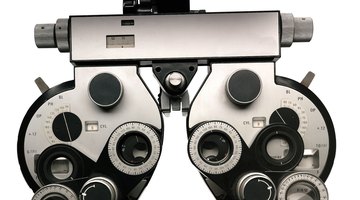Eye doctors are specialized medical professionals who serve the eye care needs of their patients. A varied science, optometry and its related disciplines cover a range of eye-related issues, including vision maintenance, disease treatment and orthoptics. An organ as complex and important as the eye requires a broad range of expertise for total care. The four recognized degrees for eye health professionals range in requirements from two to 12 years.
Doctorate in Medicine
As the highest tier of eye health professionals, ophthalmologists must earn a doctorate in medicine. Ophthalmologists are eye surgeons, medical doctors who perform intricate operations on the eye itself. As physicians, ophthalmologists must have four years of undergraduate studies, an additional four years in medical school, one year of internship and three years as a resident doctor before gaining their doctorate. A certified M.D., an ophthalmologist can write prescriptions, perform surgeries and serve as a general practitioner anywhere in the United States. In addition to the standard curriculum of medical studies, ophthalmologists must complete a specialization in ophthalmology as part of their medical residency.
Doctorate in Optometry
This graduate-level degree fulfills the licensing requirement for optometrists. The O.D. requires an initial undergraduate degree, then four years of study at an accredited college of optometry. Recipients of this degree are qualified to diagnose and treat diseases of the eye, perform vision tests and write prescriptions for corrective lenses. Optometrists are the primary-care provider for eye-related issues, but are not qualified as general physicians. Students in these programs generally complete three years of coursework, followed by a final year of work in an optometry clinic.
Certified Orthoptist Degree
Orthoptists are specialists in the diagnosis and treatment of disorders in the eye’s musculature, like lazy eye and cross-eye. Orthoptists also help diagnose coordination problems that result from irregular eye movement. Orthoptists must complete two years of post-graduate training in an accredited orthoptic program to receive the C.O., a master's-level degree. Most orthoptists assist ophthalmologists in pediatric settings, as the conditions that inform the orthoptist's specialty are often treated in childhood. Orthoptists who work with adult patients typically help correct eye problems associated with injury or neurological disorders.
Associate Degree in Optometric Technology
Opticians create the corrective lenses that an optometrist or ophthalmologist prescribes. A certified optician must have earned an Associate Degree in Optometric Technology, a two-year program, from a certified school of optometry. These programs train the student in the use of advanced machinery for the fabrication of vision aids. Opticians typically work alongside ophthalmologists or optometrists in larger medical practices, or for the manufacturers of glasses and contact lenses. Some schools also offer a two-semester certificate that qualifies the recipient as an optometric technician, or assistant to a certified optician. Optometric technicians verify prescriptions, perform sales duties and assist in frame selection and repair.
Related Articles
References
Writer Bio
Douglas Matus is the travel writer for "West Fort Worth Lifestyle" magazine, and spent four years as the Director of Humanities for a college-prep school in Austin. Since 2005, he has published articles on education, travel and culture in such publications as "Nexus," "People's World" and "USA Today." Matus received an Education Pioneers fellowship in 2010 and an MFA from CalArts in 2011.










